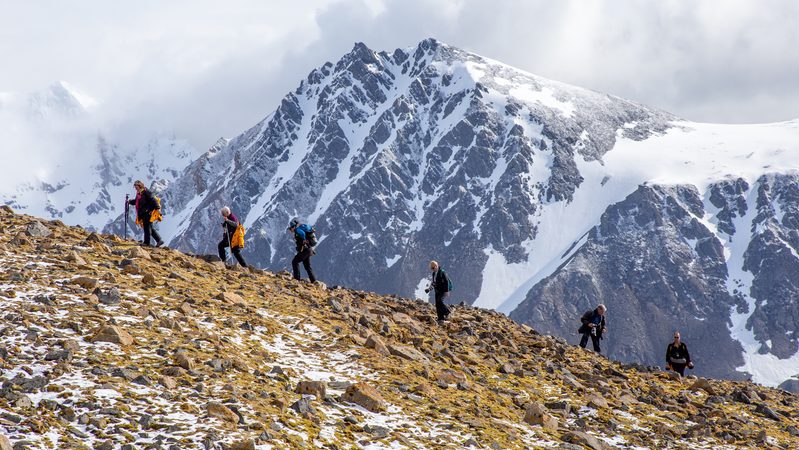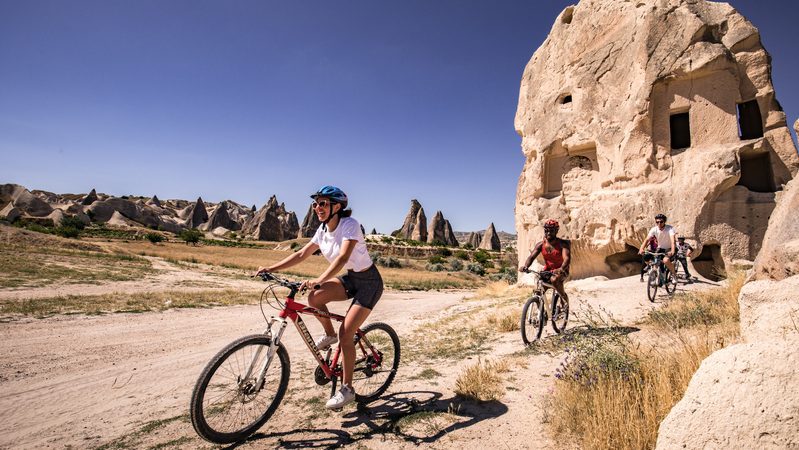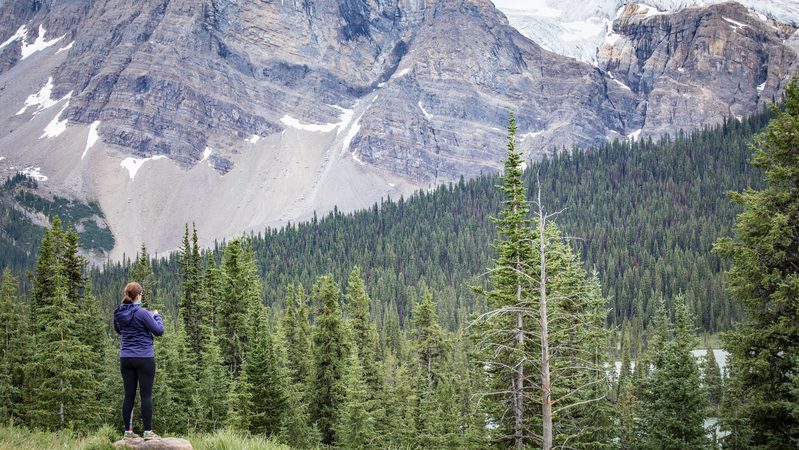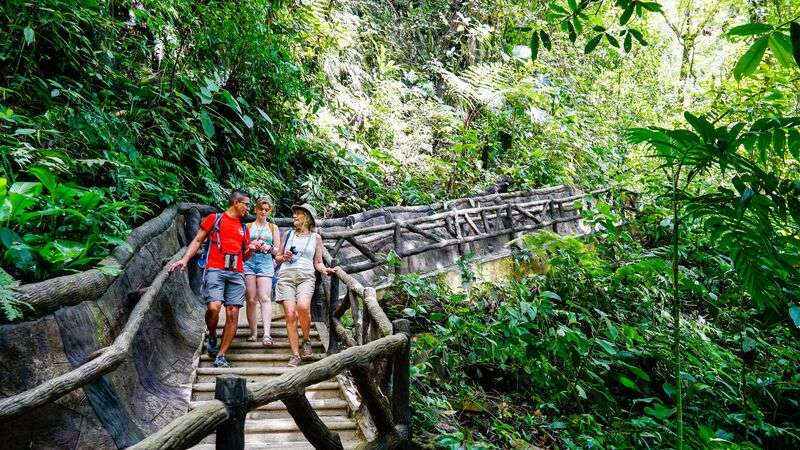At COP26, the world’s largest climate change conference, our co-founder and chairman Darrell Wade has been rallying and leading the tourism industry to take real action on climate change. Here’s what that means for us.
The world we love is threatened, and if we want to continue to explore it, we must first protect it. That’s why we’ve joined other leading travel organisations at COP26 in Glasgow to commit to ambitious industry-wide decarbonisation, which will see us halve our carbon emissions by 2030.
“Climate change is a huge, existential crisis for our industry,” said Darrell Wade at the launch of the Glasgow Declaration for Climate Action in Tourism at COP26.
In fact, climate change threatens the very destinations, people and wildlife that tourists travel to visit – but pre-pandemic, travel and tourism contributed about 8 per cent of the world’s total greenhouse gas emissions. We can’t ignore that and we must start to take urgent action to radically reduce emissions across the board.
There’s been a lot of talking at Glasgow. And that’s important. But now is the time to really do the work…
Why we are halving our carbon emissions

Let’s get into the nitty-gritty – why are we doing this? To put it simply, a future where we ignore climate change isn’t pretty. The 2015 Paris Agreement saw the governments of nearly every country in the world commit to limiting global temperature rise to below 2°C above pre-industrial levels (the temperature before the industrial revolution of 1760 – 1840), aiming to limit global warming to 1.5°C. In 2018, the UN’s Intergovernmental Panel on Climate Change (IPCC) warned that we must stick to the lower end of the goal, with an increase of no more than 1.5°C.
A difference of half a degree may not sound like a lot, but if the warning is ignored, the results could be catastrophic, with threats of droughts, floods, decimation of coral reefs, extreme heat, loss of biodiversity and ecosystems and widespread poverty significantly ramping up. To limit global warming to 1.5°C, greenhouse gas (GHG) emissions need to be cut in half by 2030, and drop to net zero by 2050.
Intrepid has been carbon neutral since 2010, but it’s clear that being carbon neutral is no longer enough for the travel industry. The effects of climate change are already apparent, with severe weather events threatening people and wildlife worldwide. In 2020, Intrepid published its seven-step Climate Commitment Plan, which clearly outlines the actions we will take to reduce our emissions. That same year, we became the first global tour operator with verified science-based targets, as approved by the Science Based Targets initiative (SBTi).
Under our science-based target, we have committed to reducing absolute scope 1 and 2 greenhouse gas emissions by 71% by 2035, and reducing scope 3 greenhouse gas emissions from our offices by 34% per full-time employee, and from our trips by 56% per customer per day over the same period. That all may sound a little confusing, but with clear science-based targets to hold us accountable – we will report on our progress each and every year in our integrated annual report – we’ll reduce emissions across our operations and supply chains, marking the next phase of our ongoing carbon journey.
How we’re reducing our carbon emissions

So how are we going to make this happen? The goal of a 1.5°C future stays front of mind in everything we do, from the day-to-day operation of our offices to the development of new adventure tours. Currently four of our global offices use 100% renewable energy, and we aim for this to be standard across all our offices by 2025.
We’re reviewing our 50 most popular trips, and by 2022 we aim to have all flights under 90 minutes swapped out for low carbon (and often far more interesting) land, road or river alternatives, where viable. Take our Premium Cambodia tour, for example – what was once a flight from Phnom Penh to Siem Reap is now a fascinating riverboat journey down the Tonle Sap River. This means fewer emissions while travellers are exposed to a side of local life few tourists get to see – we think that’s a win-win. Accommodation for the new range of Premium tours was often selected for its eco-credentials (think renewable energy sources and produce grown on-site) and many local experiences centre around environmental or wildlife conservation projects.
New walking and cycling tours are in constant development, providing not only a wonderful way to see a part of the world, but also significantly lower carbon emissions. New domestic tours in Australia, New Zealand, USA, Canada and the United Kingdom mean travellers from these regions don’t need to catch a long-haul flight to experience a proper Intrepid group tour (local leaders, authentic experiences, expert knowledge – all that good stuff), and public transport is widely used on tours.
Our carbon emission reduction projects

We’re also trying to do our bit to draw down carbon from the atmosphere. While reducing the amount of carbon we all produce is vital, these types of projects also help to support climate action.
The Intrepid Foundation has partnered with some fantastic projects dedicated to removing carbon from the atmosphere. Blue carbon ecosystems are natural coastal wetlands of seagrasses, mangroves and tidal marshes, and they absorb and store carbon 30-50 times faster than trees. Under the threat of urban development, industry and agriculture, 65% of these ecosystems have been lost worldwide – but that’s where the Blue Carbon Lab comes in. Dedicated to the restoration of these ecosystems, the Blue Carbon Lab uses innovative blue carbon research to mitigate the effects of climate change. We’re donating more than A$80,000 to support the Blue Carbon Lab’s research into the restoration of coastal wetlands in Victoria, Australia, and you’ll also have the chance to get behind the cause.
Intrepid has teamed up with Ecologi to create the world’s first travel-powered forest (it’s as cool as it sounds). Ecologi partners with various projects across the world to offset carbon emissions, and they plant trees while they’re at it. Any adventures you take with Intrepid are already totally carbon offset, but you now have the option to sign up to a monthly subscription plan to offset your daily carbon footprint through these projects and plant real-life trees. For every tree Ecologi plant for you, Intrepid will plant one too – we’re talking entire forests powered by Intrepid travellers.
While carbon offsetting our unavoidable emissions is an important step towards tackling climate change, the need to reduce emissions is more urgent than ever.
Urgent industry-wide decarbonisation must be the priority for everyone in tourism.
So, as the COP26 delegates pack up and head back to their respective countries, we will continue to accelerate our commitments towards halving emissions by 2030.
We’re not going to stop talking about – or taking action on – climate change, and you shouldn’t either.

